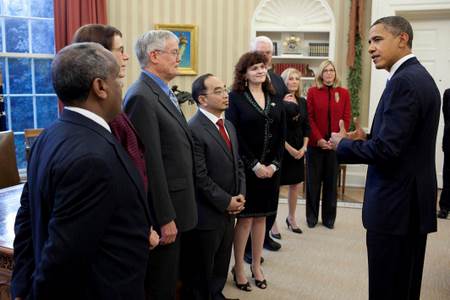Woodruff Honored by President at White House
 |
|
President Barack Obama greets the 2010 Presidential Awards for Excellence in Science, Mathematics and Engineering Mentoring recipients in the Oval Office, Dec. 12, 2011. Teresa Woodruff, PhD, far right. (Official White House Photo by Pete Souza). |
Teresa Woodruff, PhD, the Thomas J. Watkins Professor of Obstetrics and Gynecology at Northwestern University Feinberg School of Medicine, was one of nine individuals awarded the prestigious Presidential Award for Excellence in Science, Mathematics and Engineering Mentoring on Dec. 12 at the White House.
The award honors Woodruff’s work with the Women's Health Science Program for High School Girls and Beyond (WHSP), a Northwestern Medicine program. Designed to mentor urban minority high school girls, the program prepares these students for college and careers in science and health.
"Meeting President Obama in the Oval Office was a true honor and humbling event," said Woodruff, also director of the Institute for Women's Health Research.
"This award is for the hundreds of faculty, staff, and students throughout Northwestern University and Northwestern Memorial Hospital who donate their time to mentorship," Woodruff added. "Our program focuses on the next generation of female leaders. Our goal is to ensure that the future is filled with a diverse group of problem solvers ready to meet the world's challenges."
WHSP, a four-year-old program, targets primarily African American and Latina girls from disadvantaged backgrounds in Chicago. The young women can study at four different Northwestern academies: cardiology, physical science, infectious disease, and oncofertility. The science program is part of the Institute for Women's Health Research at Feinberg.
Woodruff, a reproductive endocrinologist, researches female reproductive health and infertility and is chief of the Division of Fertility Preservation. She also leads the Oncofertility Consortium, a national team of oncologists, fertility specialists, social scientists, educators, and policymakers to translate her research to the clinical care of women who will lose their fertility due to cancer treatment. In addition, she has been an advocate for sex and gender inclusivity and study in basic science, translational studies, and clinical trials.